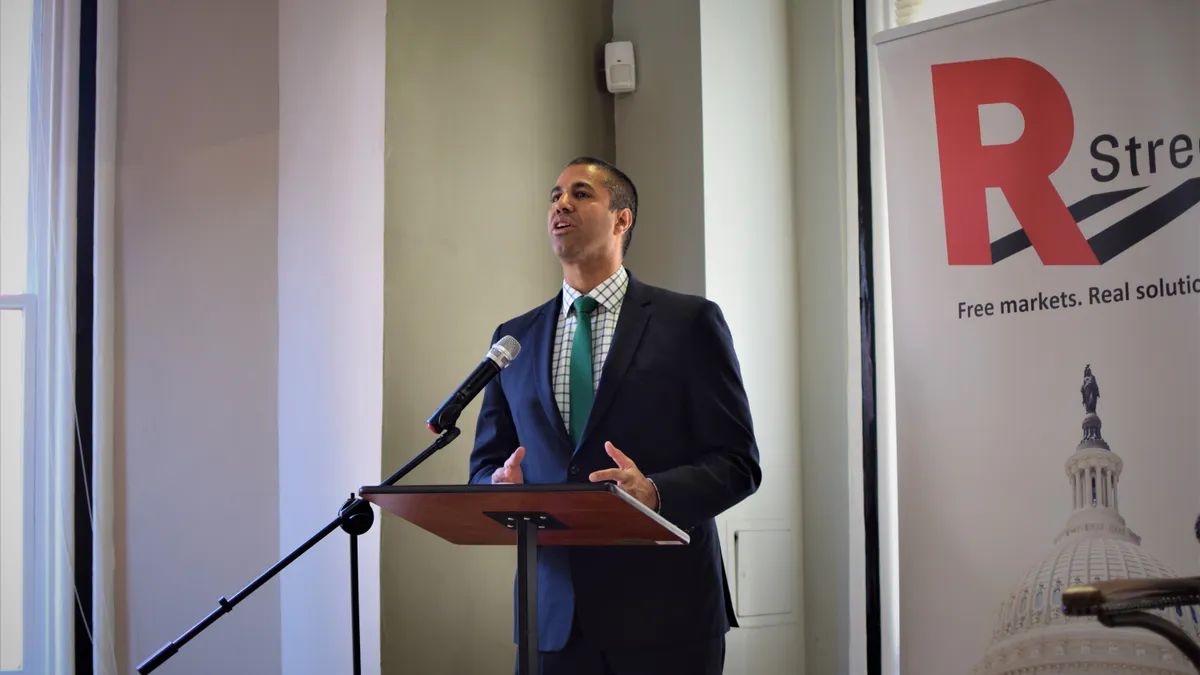Dive Brief:
-
If the internet "flourished" before the 2015 net neutrality rules, it will work again with the removal of these regulations, said FCC Chairman Ajit Pai, speaking at an event Tuesday in D.C. After all, this legal framework of free internet was what first allowed for the rise of the modern digital age and tech giants such as Google and Facebook, he said. Pai was joined by fellow FCC Commissioners Mike O'Rielly and Brendan Carr, FTC Acting Chairman Maureen Ohlhausen and a panel of experts, all of whom argued in favor of the "Restoring Internet Freedom" initiative.
-
The speakers debunked myths about internet freedom they felt skewed public discourse in favor of existing regulations. Many opponents to Pai's proposal cite ISP censorship and control of internet traffic as a threat to an open internet, but Pai was among those arguing content and platform providers like Twitter already do this. Curated internet services and bundled offerings were not prohibited under net neutrality rules and have continued since 2015.
-
The sidelining of the FTC under net neutrality rules was crippling to broadband regulation, and the return of the onus for regulation to this commission from the FCC will expedite and streamline regulatory proceedings, according to the speakers. Other topics of general consensus were the need for congressional direction on broadband regulation — given that the last significant legislation on the matter was the Telecom Act of 1996 — and the role market pressures will play in ensuring the broadband market aligns itself with customer desires.
Dive Insight:
The FCC votes on the net neutrality proposal in less than three weeks, but expert consensus is confident the measure will pass 3-2 and withstand challenges in the D.C. Circuit Court. The proposal will return broadband regulation back to the regulatory scheme accepted by both political sides for nearly two decades.
Despite its likely success, debate and criticism of Pai's proposal will continue to blaze through public forums.
Pai sharply criticized the politicization and media sensationalism around the matter. He pushed back at famous and influential individuals, such as Mark Ruffalo and Cher, whose Twitter comments about him and net neutrality he considers unfairly influential given their lack of expertise in broadband regulation.
Those in favor of "internet freedom" over "net neutrality," both terms of which refer to different understandings of how to best protect customers, are often vilified as authoritarian-like controllers of traffic and censorship. Yet the basis for the divide between sides ultimately lies in different understandings of where the onus for regulation lies and how effective general versus targeted regulation is.
Even among experts, many facets of broadband regulation are hard to understand. Nearly every speaker criticized the internet conduct standard, a vague and widely interpreted framework.
When the 2015 regulations were passed, the digital landscape looked very different than it does today. Digitization and cloud computing were not yet the backbone of a modern business, and widespread AI applications and investment in lucrative technologies such as blockchain were barely on the radar for most companies.
What FCC members and businesses need to assess is how today's digital landscape will mesh with the environment they operated in three years ago. For some, this may not mean any changes, but for companies riding the forefront of innovation and digitization, this could mean GDPR is not the only regulation requiring major internal changes in the near future.













